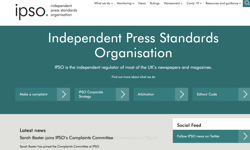
The Society has warned against making the fund’s eligibility criteria too narrow and questioned who will identify what is journalism of public interest.
Culture Secretary Jeremy Wright announced The Future News Fund today following recommendations in the Cairncross Review.
“With the digital revolution giving rise to a pressing need for news publishers to develop new approaches and tools, Dame Frances Cairncross recommended government funding for innovative approaches to improve the supply of public interest news,” reported the Department for Digital, Culture, Media and Sport.
The Society of Editors said the pilot fund was a welcome step, but care must be taken that support for media innovation is not restricted to what only a small band of people consider to be in the public interest.
“While we support whole-heartedly the idea that new and innovative forms of delivering news, in particular from local communities, should be supported, the danger lies in who will decide which initiatives are worthy and which are not,” commented Society of Editors executive director Ian Murray.
“Once a principle is set that some forms of journalism are considered to be in the public interest, then the opposite – journalism not considered to be important – is also created.
“For instance, where few would argue that coverage of local government and courts is essential public interest journalism, there is an argument to be made that grass roots sports are also an important part of life that bonds communities together. Will voices supporting a broad range of coverage be heard?
“Dame Frances also singled out investigative journalism as worthy of support, but how will this sit with state-funding? How will the independence of investigative journalists and their publishers from the influence from the fund-providers be ensured?
“These are decisions that should not be taken by a narrow group behind closed doors, but in open debate with the industry,” added Murray.
The new fund will be administered by innovation foundation Nesta who will liaise with publishers. However, no details have been released as to who will determine what constitutes public interest journalism to qualify for funding support.
In her review, Dame Frances Cairncross described the different types of news which could be categorised as ‘public interest’ – including investigative journalism and reporting on the activities of public institutions.
The pilot fund will launch in autumn 2019 and run until the end of the financial year. Its outcomes will be used to shape decisions about whether to run a full, expanded fund in the future.
The Government will publish its full response to the Cairncross Review later this year.
In a statement, DCMS Secretary of State Jeremy Wright said on Sunday:
“A strong and independent press is vital for a healthy democracy to thrive and the Government is committed to securing its sustainability.
While we are still developing our full response to the Cairncross Review, our plans to open a pilot fund now will help papers explore innovative ways of providing the public service journalism that citizens need and deserve.”
Dame Frances Cairncross said: “I am delighted that the innovation fund suggested in my review is being piloted. Innovation is important if news organisations, and especially small and local providers of news, are to survive and to provide accessible public-interest news for the widest possible audience.”
The DCMS said that Nesta will administer the pilot Future News Fund, ‘which will have a particular focus on helping providers of local and regional news. It will be used to fund a number of different initiatives, allowing publishers to test or expand new ways of providing sustainable public interest news.
‘The Government hopes these publishers will benefit from the fund’s testing of new business models and greater use of data, which can be adopted across the industry.
‘The pilot could also be used to fund a Future News Prize, to encourage wider thinking about how to address the challenges in the sector.’
Valerie Mocker, director of the Future News Fund Pilot, Nesta said: “Reliable, accurate and high quality news at local level has been under threat for some time now, eroding an essential mechanism for citizens to engage in their communities, exercise their democratic rights and hold institutions to account.
“We are delighted that Nesta will be able to play a part in addressing this problem with The Future News Fund – backing promising technologies, models and ideas so communities across the UK have access to reliable and accurate news about the issues that matter most to them.”












